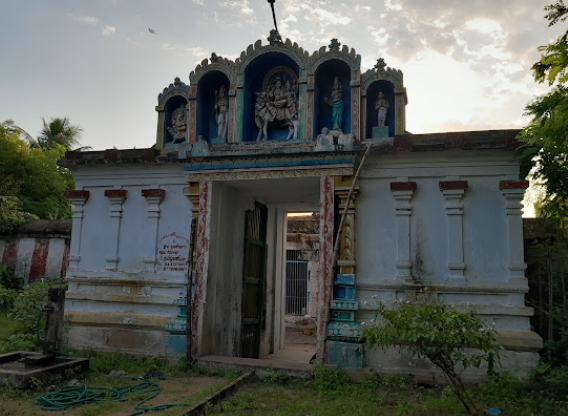The Gnanaparameswarar Temple is believed to have been originally constructed during the early Chola period, with later enhancements made using granite by Aditya Chola I. The temple features 23 stone inscriptions that date back to various Chola kings, starting from Parantaka Chola I. Historically, this place has been known by several names, including Chaturvedi Mangalam, Thirumayanam, and Thirumeignanam. The temple is currently under the administrative control of the Hindu Religious and Charitable Endowments Department of the Government of Tamil Nadu (HR&CE).

Gnanaparameswarar Temple
The Gnanaparameswarar Temple is a Hindu temple situated in Thirumeignanam, Thanjavur district, Tamil Nadu, India. It is dedicated to Lord Shiva, who is worshipped here as the moolavar presiding deity in the form of Gnanaparameswarar. His consort, Parvati, is revered as Gnanambikai. This sacred site is also referred to as Tirunallur Mayaanam.
Timings
Morning: 8:00 AM to 11:00 AM & Evening: 5:00 PM to 7:30 PM
Entry Fee
Free of charge
Do's and Don'ts
- Pray Before Pilgrimage: Offer prayers to your Ishta Devata (personal deity) before embarking on your journey to the temple.
- Contact Temple Devasthanam: Reach out to the temple information centre for inquiries regarding temple details, pooja arrangements, and other relevant information.
- Reserve Travel and Accommodation: Ensure you book your travel and accommodation in advance to avoid any last-minute hassles.
- Maintain Cleanliness: Take a bath and wear clean clothes before entering the temple to show respect and devotion.
- Focus on Worship: Concentrate on God and Goddess while inside the temple premises.
- Practice Silence: Maintain silence and recite your Ishta Mantra quietly to yourself within the temple.
- Observe Customs and Traditions: Follow the ancient customs and traditions while in the temple to honour its sacredness.
- Deposit Offerings Properly: Place your offerings in the hundi (donation box) only.
- Avoid Non-Worship Activities: Do not visit the temple for any purpose other than worshipping God and Goddess.
- No Smoking: Smoking is strictly prohibited within the temple premises.
- No Alcohol Consumption: Consuming alcoholic beverages in the temple is not allowed.
- No Non-Vegetarian Food: Eating non-vegetarian food is prohibited in the temple.
- Avoid Mediators for Quick Darshan: Do not approach mediators for expedited darshan, as it may cause inconvenience to others.
- No Weapons: Carrying weapons inside the temple is not permitted.
- Avoid Headgear: Do not wear headgear such as helmets, caps, turbans, or hats while in the temple.
Dress Code
For Men: Men are expected to wear traditional attire, such as dhotis or lungis, along with a shirt or kurta. It is advisable to avoid wearing shorts, sleeveless shirts, or tight-fitting clothing.
For Women: Women should opt for traditional attire like sarees, salwar kameez, or long skirts, ensuring modesty. Avoid wearing revealing or tight-fitting clothing, shorts, or sleeveless tops while in the temple.
How to reach
By Air: The nearest airport is Trichy Airport, located approximately 111 km from the temple.
By Rail: Kumbakonam Railway Station is about 16 km away, providing convenient access by train.
By Road: From Kumbakonam Bus Stand the temple is 15.9 km away.
Nearby Cities and Rivers
Rivers :
- Arasalaru River: This river flows near the temple, enhancing its sacredness, as many believe that taking a holy dip here purifies devotees and brings spiritual benefits.
- Kaveri River: Located not far from the temple, this major river holds immense religious importance in Tamil Nadu and is associated with various rituals and festivals in temples along its banks.
Cities:
- Kumbakonam: The nearest major city, known for its rich temple heritage and as a spiritual hub in Tamil Nadu.
- Thanjavur: Another historically and culturally significant city, famous for its Chola architecture and proximity to numerous ancient temples.